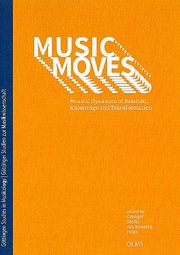Music Moves von Charissa Granger/Friedlind Riedel/Eva-Maria Van Straaten et al
Music Moves
Musical Dynamics of Relation, Knowledge and Transformation., Göttingen Studies in Musicology/Göttinger Studien zur Musikwissenschaft 7
ISBN/EAN: 9783487154428
Sprache: Englisch
Umfang: 244 S., mit einer CD.
Einband: kartoniertes Buch
Erschienen am
15.11.2016
Auf Wunschliste
Music Moves. While the volume's main title suggests a rather unambiguous stand towards the manifold possible relations between music and movement, its various chapters each nuance this seemingly univocal articulation. Rather than providing the reader with an all-inclusive theory on movement that is simply mapped onto the manifold complex musical dynamics the volume attends to, each chapter explores these composite dynamics in and on their own terms. Besides a clear but diverse focus on questions of music and movement, the individual chapters have common conceptual, methodological and theoretical ground. Issues of central concern for musicology (here understood in its most inclusive sense), such as questions of power, musical meaning, and identity construction underlie most of its chapters. Three uniting concepts, which are of crucial importance for debates within musicology and cultural studies, emerge most prominently from, frame, and connect the individual papers: relation, knowledge, and transformation. Due to its comprehensive geographical, musical and theoretical range, the approximations of music and movement offered within the volume explore issues of relevance to musicology, anthropology, critical theory, philosophy, post-colonial theory and cultural studies. Music Moves. Anstelle der Anwendung einer allgemeinen Theorie der Bewegung für die verschiedensten musikalischen Dynamiken und Musiken, erarbeiten die einzelnen Beiträge anhand von konkreten Fallstudien je spezifische Bewegungsbegriffe. Die Kapitel verbindet eine konzeptuelle, methodologische und theoretische Basis. Es werden zentrale Fragen der Musikwissenschaft aufgerufen, wie etwa die nach Machtbeziehungen, musikalischer Bedeutung und Identitätskonstruktionen. Daraus gehen drei verbindende Konzepte hervor: Relation, Wissen und Transformation. Dabei werden nicht nur Diskurse der Musikwissenschaft, sondern auch der Anthropologie, Kritischen Theorie, Philosophie, Postkolonialen Theorie und der Kulturwissenschaft mit einbezogen.






